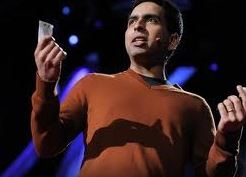Salman Khan: Standing In for Newton
 Looking for a practical means of tutoring family members, Salman created the Khan Academy YouTube account in late 2006. Initially nothing more than a means of helping friends and family members brush up on their algebra, the YouTube account was not planned as the first step in some major innovation in education. But, as tends to happen to good ideas on the internet (good ideas and Korean music videos that is) Khan’s video lessons went viral. His concise, practical, and relaxed teaching methods attracted viewers from all over the world. In 2009, prompted by the growing popularity of his videos and the testimonials of appreciative students, Salman quit his job as a hedge fund analyst to focus entirely on developing Khan Academy to the point it has reached today.
Looking for a practical means of tutoring family members, Salman created the Khan Academy YouTube account in late 2006. Initially nothing more than a means of helping friends and family members brush up on their algebra, the YouTube account was not planned as the first step in some major innovation in education. But, as tends to happen to good ideas on the internet (good ideas and Korean music videos that is) Khan’s video lessons went viral. His concise, practical, and relaxed teaching methods attracted viewers from all over the world. In 2009, prompted by the growing popularity of his videos and the testimonials of appreciative students, Salman quit his job as a hedge fund analyst to focus entirely on developing Khan Academy to the point it has reached today.
“If Isaac Newton had done YouTube videos on calculus, I wouldn’t have had to.”
Salman Khan during his TED Talk in Long Beach, California, March 2011
Backed significantly by – amongst others – Google and the Bill & Melinda Gates Foundation, Khan Academy has grown tremendously and currently offers over 4,000 lecture videos in 23 languages free of charge to anyone with access to the internet. Both Khan Academy and Salman himself have been featured in numerous media outlets. The TED talk outlining his vision of the future of education – explaining how Khan academy fits into that picture – is a subject he also covers in his excellent book: The One World Schoolhouse: Education Reimagined.
You may have an interest in also reading…
Mohamed Ould Abdel Aziz: A Pragmatist Claiming Centre Stage
It is a long lane that has no turning. The life of Mauritanian president Mohamed Ould Abdel Aziz is marked
Market Braced as Sanctions Continue on Iran’s Energy Sector
Iran’s oil sector has been targeted by fresh sanctions from the US, while the EU is in talks over what
Roberta Pinotti: Top Performance on a Shoestring
For Italian Defence Minister Roberta Pinotti it is all about attaining economies of scale. Whilst EU member states spend over

















































































